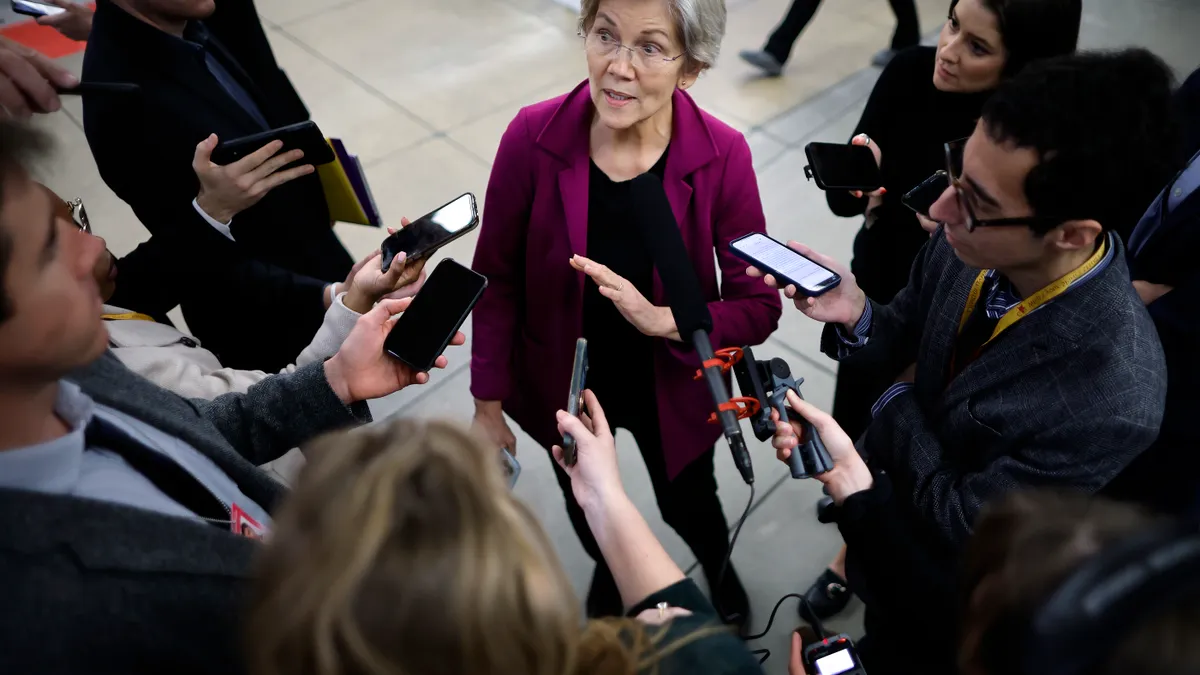Sen. Elizabeth Warren, D-MA, wants names.
In a follow-up letter Monday to Goldman Sachs CEO David Solomon, Warren asked which of the bank’s employees were involved in the March purchase of a $24 billion debt portfolio from Silicon Valley Bank (at a $1.8 billion discount). Warren also asked Solomon to name Goldman employees who were underwriting, in the same time frame, a $2.25 billion sale of SVB stock meant to raise capital — and whether any Goldman employees played a role in both transactions.
That line of questioning ratchets up Warren’s scrutiny of Goldman’s roles as both an adviser to SVB, which would fail within days of the transactions, and as a buyer of devalued assets — a duality Warren has painted as a conflict of interest.
Warren initially wrote Solomon in late June, accusing Goldman of “profit[ing] from SVB’s troubles and … seeking to use accounting tricks to avoid replenishing the federal deposit insurance fund.”
She made clear Monday she was unsatisfied with Solomon’s response last month. Solomon’s July 13 letter confirmed Goldman’s dual role and disclosed that Goldman expected to realize a gain of roughly $60 million from the purchase and sale of the SVB portfolio, Warren said. But Solomon’s letter otherwise “failed to provide key information,” she added Monday.
“I am particularly concerned that, in response to my question about actions that you took to address Goldman’s conflicts of interest, the only answer you provided was to inform me that ‘in this case, among other things, we informed SVB in writing’ of the conflict,” Warren wrote Monday to Solomon.
In a statement seen by American Banker and Bloomberg, a Goldman spokesperson said the bank’s “clients often request that we provide multiple financial services, and we have procedures and controls designed to identify and address potential conflicts of interest.”
"Here, as per our conflicts procedures and controls, we specifically informed SVB in writing that Goldman Sachs was not acting as SVB's advisor on the portfolio sale and that SVB should not rely on Goldman Sachs for any advice in this regard but instead should hire a third-party advisor,” the statement read.
Warren asked Solomon on Monday whether Goldman did anything to prevent conflict of interest other than flag it in writing to SVB. She also asked whether Goldman reviewed the potential consequences of its actions with regard to SVB’s resilience.
Warren is not alone in raising concern over Goldman’s role ahead of SVB’s collapse. Goldman is “cooperating with and providing information to various governmental bodies in connection with their investigations and inquiries” regarding the SVB portfolio sale and proposed capital raise, the bank disclosed in March. The Wall Street Journal identified the Federal Reserve and the Securities and Exchange Commission as among the agencies investigating.
Warren’s letter Monday posed new questions for Solomon, too. She asked specifically for a breakdown of Goldman’s projected $60 million in profits from the SVB transactions. She also sought more details into what Goldman dubbed “arms-length negotiations” between the bank and SVB in the portfolio sale — again, names.
Warren also asked for other instances, in the past three years — perhaps a reference to COVID-era distress — in which Goldman may have played a dual role for clients, and whether the bank has made any adjustments to policy surrounding conflict of interest since SVB’s collapse.
The senator seeks a reply by Aug. 21.











